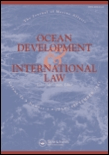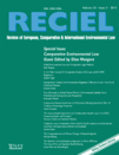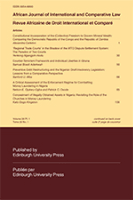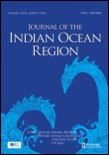
OCEAN DEVELOPMENT AND INTERNATIONAL LAW
Scope & Guideline
Navigating the Future of Ocean Governance
Introduction
Aims and Scopes
- International Maritime Law:
The journal extensively covers topics related to the United Nations Convention on the Law of the Sea (UNCLOS), addressing legal frameworks governing maritime boundaries, navigation rights, and jurisdictional issues. - Environmental Protection and Conservation:
A significant focus is placed on the legal aspects of marine environmental protection, including the regulation of biodiversity, the management of marine protected areas, and the environmental impact of maritime activities. - Cultural Heritage and Underwater Resources:
The journal explores the legal challenges associated with the protection of underwater cultural heritage, emphasizing the need for regulatory frameworks that safeguard historical sites and resources in marine environments. - Emerging Maritime Technologies:
Recent publications reflect a growing interest in the legal implications of new maritime technologies, such as autonomous ships and the impact of climate change on maritime law. - Regional and Global Maritime Disputes:
The journal addresses ongoing maritime disputes, providing analyses on issues such as territorial claims, fishing rights, and the geopolitical dynamics influencing international maritime relations.
Trending and Emerging
- Biodiversity Beyond National Jurisdiction (BBNJ):
There is a marked increase in research focused on the BBNJ Agreement, emphasizing the need for effective governance of marine biodiversity in areas beyond national jurisdiction. - Climate Change and Ocean Law:
The intersection of climate change and maritime law is becoming increasingly significant, as papers explore the legal obligations and frameworks for addressing climate impacts on marine environments. - Autonomous Maritime Technologies:
Research on the legal implications of autonomous ships and marine technologies is emerging as a key theme, reflecting the need to adapt existing legal frameworks to new technological realities. - Marine Spatial Planning and Ecosystem-Based Management:
The emphasis on ecosystem-based management and marine spatial planning is growing, highlighting the importance of integrated approaches to managing marine resources sustainably. - Regional Cooperation on Maritime Issues:
There is a trend towards exploring regional cooperation in maritime governance, particularly in areas with complex geopolitical dynamics, such as the South China Sea and Arctic regions.
Declining or Waning
- Traditional Fishing Rights:
Discussions surrounding traditional fishing rights and their legal frameworks have decreased, possibly due to the increasing emphasis on sustainable fisheries management and broader environmental concerns. - Historical Maritime Law:
The exploration of historical maritime laws and treaties has waned, with a reduced number of papers addressing historical contexts of maritime law compared to contemporary issues. - Conventional Maritime Security Issues:
Topics related to conventional maritime security, such as piracy and territorial disputes, seem to be less frequently covered, indicating a shift towards more nuanced discussions surrounding environmental security and resource management.
Similar Journals

Revista de Derecho Comunitario Europeo
Illuminating Legal Frameworks and Political DynamicsRevista de Derecho Comunitario Europeo, published by CENTRO ESTUDIOS POLITICOS CONSTITUCIONALES, serves as a vital platform for scholarly dialogue in the fields of Law, Political Science, and International Relations. Established in 2008, this esteemed journal focuses on the analysis of European Community Law, providing insightful articles that explore the dynamic intersection of legal frameworks and political science within the European context. Although currently categorized in the Q4 quartile for its fields, the journal is dedicated to enhancing its impact and visibility, particularly among researchers and practitioners interested in the evolution of European legal structures. While it does not offer open access, its rigorous peer-review process ensures the publication of high-quality research, making it a crucial resource for students and professionals aiming to deepen their understanding of contemporary legal and political issues in Europe. The journal's commitment to advancing scholarship in these areas is reflected in its ongoing publication through 2024, situated in Madrid, Spain.

Journal of East Asia and International Law
Fostering Dialogue on International Law in a Dynamic RegionThe Journal of East Asia and International Law, published by the YIJUN Institute of International Law, serves as a vital platform for scholarly discourse in the field of law, with a particular focus on the complexities of East Asian legal systems and their interactions within the global context. Established in 2011 and based in Seoul, South Korea, this journal has been pivotal in fostering research that examines legal issues impacting East Asia, making significant contributions to the understanding of international law in this dynamic region. With its ISSN 1976-9229, the journal provides a valuable resource for researchers, professionals, and students interested in the evolving legal landscapes of East Asia. Though currently categorized in the Q4 quartile for law in the Scopus rankings, its dedication to enhancing legal scholarship positions it as a relevant player among emerging international law journals, encouraging submissions that explore innovative legal approaches and analyses. As ongoing interdisciplinary discussions deepen, the Journal of East Asia and International Law aims to enrich the academic community's understanding of international legal frameworks within East Asian contexts.

Cambridge International Law Journal
Empowering legal minds with open-access scholarship.The Cambridge International Law Journal, published by Edward Elgar Publishing Ltd, is a pivotal resource for scholars and practitioners engaged in the dynamic field of international law. With an ISSN of 2398-9173 and an E-ISSN of 2398-9181, this journal provides a platform for interdisciplinary research, addressing contemporary legal issues and developments from a global perspective. Since its inception in 2012, it has garnered recognition, reflected in its 2023 Scopus rank of #549 out of 1025 in the category of Social Sciences (Law), positioning it in the 46th percentile. The journal embraces an open-access model, ensuring that its cutting-edge scholarship reaches a wide audience. The objective of the Cambridge International Law Journal is to foster dialogue among legal scholars, practitioners, and students, making significant contributions to the discourse around international legal frameworks. For those seeking comprehensive insights and analyses in law, this journal stands out as an essential resource.

Canadian Yearbook of International Law
Bridging Knowledge Gaps in Global JurisprudenceCanadian Yearbook of International Law, published by Cambridge University Press, serves as a vital platform for scholarly discourse within the realms of law and international relations. With a rich history dating back to 1989, the journal engages a diverse audience of researchers, academics, and practitioners by offering insightful analyses of contemporary legal issues and policy debates. Although the journal currently holds a Q4 quartile ranking in both the law and political science categories, it remains an essential resource for understanding the evolving landscape of international law. Despite the current limitations in access options, the journal's rigorous peer-review process ensures that each publication maintains high academic standards, encouraging thoughtful discussions that contribute to both theoretical and applied aspects of international law. The Canadian Yearbook helps bridge gaps in knowledge and fosters greater understanding among scholars worldwide, enhancing its significance in the academic community.

Review of European Comparative & International Environmental Law
Championing rigorous research in environmental governance.Review of European Comparative & International Environmental Law is a leading academic journal published by WILEY that serves as a vital platform for scholars and practitioners in the fields of environmental law, geography, and policy analysis. With its ISSN 2050-0386 and E-ISSN 2050-0394, it provides comprehensive insights into the comparative and international aspects of environmental legislation and governance. The journal is noted for its rigorous peer-review process and has achieved commendable rankings, including Q1 in Law and Q2 in Geography, Planning, and Development in the 2023 category quartiles. Furthermore, it holds impressive Scopus rankings, placing it within the 92nd percentile for social sciences law. The scope of the journal encompasses interdisciplinary research addressing contemporary environmental challenges, making it an invaluable resource for those engaged in the development, monitoring, and policy-making around environmental law. Published since 2013 and continuing through 2024, Review of European Comparative & International Environmental Law plays a crucial role in fostering scholarly dialogue and influencing environmental policy worldwide, ensuring access to state-of-the-art research and innovative solutions for a sustainable future.

African Journal of International and Comparative Law
Contributing to the Evolution of African Legal ThoughtAfrican Journal of International and Comparative Law is a distinguished publication that serves as a vital forum for scholarly discourse in the fields of international and comparative law, with a specific focus on legal issues pertinent to the African continent. Published by Edinburgh University Press, this journal boasts a respectable impact factor and finds its reputation bolstered by its strategic ranking within the Q3 category of law, according to Scopus metrics, where it occupies the 681st rank out of 1025 journals. Although it does not currently offer open access, the journal remains committed to fostering legal scholarship and providing critical insights that bridge the gap between theory and practice. The journal's coverage encompasses scholarly articles, case studies, and analyses of contemporary legal challenges from 2005 to 2024, making it an indispensable resource for researchers, practitioners, and students dedicated to advancing their understanding of international and comparative legal frameworks in the African context. The editorial team encourages submissions that contribute to the dialogue on legal reforms, human rights, and the impact of globalization on African law.

International Environmental Agreements-Politics Law and Economics
Navigating the intersection of law, politics, and economics for a greener world.International Environmental Agreements-Politics Law and Economics, published by SPRINGER, is a leading journal dedicated to exploring the intersection of economics, law, and political science as they relate to international environmental agreements. With impressively high rankings in its respective categories—Q1 in Economics and Econometrics, Law, and Political Science and International Relations—this journal serves as a critical platform for rigorous scholarly discourse, addressing pressing global challenges and fostering understanding among policymakers and academics alike. The journal is indexed with an E-ISSN of 1573-1553 and maintains a strong presence in Scopus, excelling in multiple disciplines (ranked #40 in Law, #39 in Political Science, and #128 in Economics). Despite being a subscription-based journal, its comprehensive analyses and innovative perspectives make it an invaluable resource for researchers, professionals, and students committed to advancing sustainable environmental governance. Established in 2003, the journal continues to contribute to the field with engaging content that encourages interdisciplinary collaboration and furthers the study of international environmental treaties.

Journal of the Indian Ocean Region
Connecting Scholars to the Heart of the Indian OceanJournal of the Indian Ocean Region, published by Routledge Journals, Taylor & Francis Ltd, is a leading academic periodical that serves as a vital resource for scholars and practitioners interested in the diverse dynamics of the Indian Ocean region. With an ISSN of 1948-0881 and E-ISSN 1948-108X, this journal spans from 2010 to 2024, focusing on an interdisciplinary approach to management, monitoring, policy, law, and environmental science, ranked within the Q2 and Q3 quartiles of several categories, including Political Science and International Relations, Sociology, and Oceanography. Although not an Open Access journal, it remains a respected forum for high-quality research, with Scopus rankings reflecting its significance in the field: #210/706 in Political Science and International Relations and #500/1466 in Sociology and Political Science. The Journal of the Indian Ocean Region is crucial for engaging with the intricate socio-political and ecological challenges of the Indian Ocean, making it an essential read for academics, professionals, and students alike pursuing knowledge and innovation in this rapidly evolving area.

Chinese Journal of Environmental Law
Empowering Voices in Environmental Legal DiscourseChinese Journal of Environmental Law, published by BRILL, is a leading interdisciplinary journal that focuses on the intersection of environmental issues and legal frameworks within the context of China and beyond. With an ISSN of 2468-6034 and an E-ISSN of 2468-6042, it has been a vital contribution to the field since its inception in 2017. The journal aims to provide a platform for researchers, policy-makers, and practitioners to discuss and analyze the evolving landscape of environmental law, particularly in the context of management and policy implications. Notable for its academic rigor, it holds a Q2 ranking in Law and a Q3 ranking in Management, Monitoring, Policy and Law. In 2023, the journal was ranked at #516 out of 1025 in Social Sciences - Law and #328 out of 399 in Environmental Science. Although not open access, it is accessible through various academic institutions, making it a critical resource for anyone interested in shaping sustainable legal practices. The Chinese Journal of Environmental Law is set to continue its convergence of knowledge through 2024, reflecting its commitment to publishing cutting-edge research that influences both policy and practice.

Legal Issues of Economic Integration
Fostering Insight into Legal-Economic InterplayLegal Issues of Economic Integration is a distinguished academic journal published by KLUWER LAW INT, focusing on the intricate interplay between legal frameworks and economic integration processes. With an ISSN of 1566-6573 and an E-ISSN of 1875-6433, the journal has carved a niche for itself in the field, evidenced by its 2023 rankings placing it in the Q3 quartile for Economics and Econometrics and Q2 for Law. Although it does not currently offer open access options, it serves as an essential resource for scholars and practitioners navigating the complex legal issues arising in the context of economic integration, providing in-depth analyses and comprehensive reviews from 2012 through 2024. The journal is recognized for its contribution to scholarly research, ranked 339th in Social Sciences Law and 493rd in Economics, by Scopus. Situated in the Netherlands, Legal Issues of Economic Integration plays a vital role in the academic discourse surrounding legal and economic policies, making it an invaluable asset for researchers, policymakers, and students alike who wish to deepen their understanding of this evolving field.